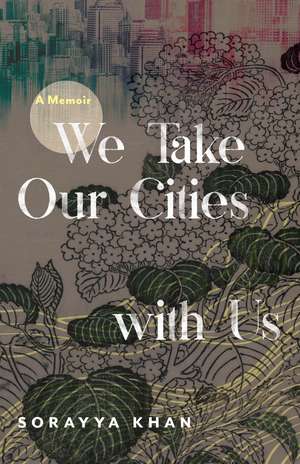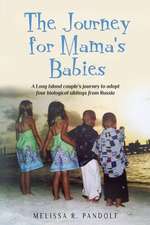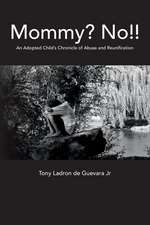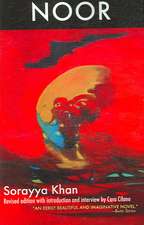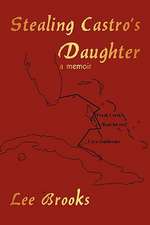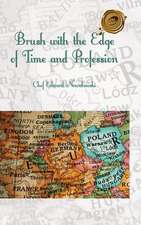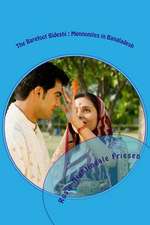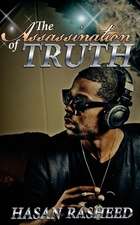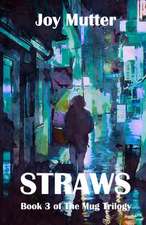We Take Our Cities with Us: A Memoir: Machete
Autor Sorayya Khanen Limba Engleză Paperback – 6 noi 2022 – vârsta ani
Preț: 110.22 lei
Nou
Puncte Express: 165
Preț estimativ în valută:
21.09€ • 21.94$ • 17.41£
21.09€ • 21.94$ • 17.41£
Carte disponibilă
Livrare economică 25 martie-08 aprilie
Preluare comenzi: 021 569.72.76
Specificații
ISBN-13: 9780814258484
ISBN-10: 0814258484
Pagini: 160
Dimensiuni: 140 x 216 x 23 mm
Greutate: 0.2 kg
Editura: Ohio State University Press
Colecția Mad Creek Books
Seria Machete
ISBN-10: 0814258484
Pagini: 160
Dimensiuni: 140 x 216 x 23 mm
Greutate: 0.2 kg
Editura: Ohio State University Press
Colecția Mad Creek Books
Seria Machete
Recenzii
“Elegant and richly remembered, [We Take Our Cities with Us] offers a poignant tribute to the complex beauty of inherited histories.” —Publishers Weekly
“The narrative is poignant, lyrical, and insightful, drawing readers into the details of the author’s physical and emotional landscapes. … A poetic memoir about a biracial author’s international life.” —Kirkus
“We Take Our Cities with Us is a memoir of uncommon delicacy and emotional force: Sorayya Khan illuminates her hybrid legacy and international upbringing, braiding the multiple threads of her complex identity. This is an intimate, beautiful, and lasting book.” —Claire Messud, author of Kant's Little Prussian Head and Other Reasons Why I Write: An Autobiography in Essays
“We Take Our Cities with Us is an exquisite memoir, a dazzling exploration of time, place, and self. I loved it.” —Lily King, author of Euphoria
“With grace and power, this mesmerizing memoir swirls from continent to continent, decade to decade, through a journey of identity, memory, loyalty, and loss. Part map, part family tree, We Take Our Cities with Us provides an intimate glimpse into what it means to make a home in the global modern age. Sorayya Khan is an exquisite storyteller.” —Eleanor Henderson, author of Everything I Have Is Yours: A Marriage
“This extraordinary memoir traverses a deeply personal terrain dotted with questions of identity, culture, and belonging. Khan engrosses the reader with myriad journeys, histories, and piercing insights. Thoroughly gratifying.” —Raza Rumi, author of Delhi by Heart: Impressions of a Pakistani Traveller
“This is a rich, wise, deeply moving reflection on cities that are both home to migrants and themselves migrants, having morphed into barely recognizable versions of their former selves. The ghosts of other times and places haunt the characters in this memoir. Sometimes that haunting is a reminder of what has been lost forever, but sometimes it can also be a consolation: even as our passports root us in one place, our curiosities, loves, and longings can make unexpected connections across supposedly insurmountable borders.” —Jonathan Gil Harris, author of The First Firangis: Remarkable Stories of Heroes, Healers, Charlatans, Courtesans and Other Foreigners Who Became Indian
“The narrative is poignant, lyrical, and insightful, drawing readers into the details of the author’s physical and emotional landscapes. … A poetic memoir about a biracial author’s international life.” —Kirkus
“We Take Our Cities with Us is a memoir of uncommon delicacy and emotional force: Sorayya Khan illuminates her hybrid legacy and international upbringing, braiding the multiple threads of her complex identity. This is an intimate, beautiful, and lasting book.” —Claire Messud, author of Kant's Little Prussian Head and Other Reasons Why I Write: An Autobiography in Essays
“We Take Our Cities with Us is an exquisite memoir, a dazzling exploration of time, place, and self. I loved it.” —Lily King, author of Euphoria
“With grace and power, this mesmerizing memoir swirls from continent to continent, decade to decade, through a journey of identity, memory, loyalty, and loss. Part map, part family tree, We Take Our Cities with Us provides an intimate glimpse into what it means to make a home in the global modern age. Sorayya Khan is an exquisite storyteller.” —Eleanor Henderson, author of Everything I Have Is Yours: A Marriage
“This extraordinary memoir traverses a deeply personal terrain dotted with questions of identity, culture, and belonging. Khan engrosses the reader with myriad journeys, histories, and piercing insights. Thoroughly gratifying.” —Raza Rumi, author of Delhi by Heart: Impressions of a Pakistani Traveller
“This is a rich, wise, deeply moving reflection on cities that are both home to migrants and themselves migrants, having morphed into barely recognizable versions of their former selves. The ghosts of other times and places haunt the characters in this memoir. Sometimes that haunting is a reminder of what has been lost forever, but sometimes it can also be a consolation: even as our passports root us in one place, our curiosities, loves, and longings can make unexpected connections across supposedly insurmountable borders.” —Jonathan Gil Harris, author of The First Firangis: Remarkable Stories of Heroes, Healers, Charlatans, Courtesans and Other Foreigners Who Became Indian
Notă biografică
Sorayya Khan is the author of the novels City of Spies, Five Queen’s Road, and Noor. The daughter of a Pakistani father and a Dutch mother, she was born in Europe, grew up in Pakistan, and now lives in Ithaca, New York, with her family.
Cuprins
My mother was white and my father was brown, my mother Dutch, my father Pakistani. If she'd had a choice, she would have been brown. She tried, sitting near swimming pools during short summers when we lived in Vienna and long ones when we lived in Islamabad, but her attempts came to a full stop with basal cell carcinoma, when sunscreen replaced sun as her best friend. My father's brown was constant, except that when he grew older and gray, in a certain light and on a certain part of him, his color lightened. I am in between. I pretend I didn't know I was brown until we moved from Austria to Pakistan and I saw it all around and made it mine. But my truth of color and country is complicated.
Color is a fact for my American-born children. We didn't wake up one morning and decide our children were ready for the news: You're brown. Almost as soon as they could talk, they put their little arms next to mine and decided they were darker. They were always right, because when summer came and my color deepened, so did theirs and our skin tone never matched. Next to their father's, their arms and legs were not a match, but close enough.
"That's okay," our sons said about my outsider status and patted my arm because they must have thought I needed comforting.
Before long, they asked, "Where are we from?"
I'd say, "You are from where we are from, Pakistan. And from where you were born, here."
Naeem, my husband, would remember my mother and add, "Also from Holland, where Nani is from," which would surprise me because I had forgotten.
There is no flag for their combination and, anyway, the white in that equation, the one-fourth of them that is my mother, was ignored even then. "Nani is the brownest person we know," I heard them say once, as if they'd always known that color was a state of mind, not pigment.
My mother's allegiance to brown was resolute. She was forever on the side of the underdog, as if she'd lived it coming of age in Amsterdam during World War II as the daughter, granddaughter, and great granddaughter of white Catholics. She'd half-joke, "I'm ab-so-lute-ly positive I have Arab blood in me," and then react to our skepticism with, "Now, don't you forget about the Arabs in Spain or the war between the Dutch and Spanish!" She threw around history the way all of us had been thrown around
the world.
I knew then that history lived alongside us, but until she was gone, I didn't understand that her history lived there as well. She was right, you cannot leave history behind. But when you are the daughter of my mother, Thera, you cannot leave her behind either.
Color is a fact for my American-born children. We didn't wake up one morning and decide our children were ready for the news: You're brown. Almost as soon as they could talk, they put their little arms next to mine and decided they were darker. They were always right, because when summer came and my color deepened, so did theirs and our skin tone never matched. Next to their father's, their arms and legs were not a match, but close enough.
"That's okay," our sons said about my outsider status and patted my arm because they must have thought I needed comforting.
Before long, they asked, "Where are we from?"
I'd say, "You are from where we are from, Pakistan. And from where you were born, here."
Naeem, my husband, would remember my mother and add, "Also from Holland, where Nani is from," which would surprise me because I had forgotten.
There is no flag for their combination and, anyway, the white in that equation, the one-fourth of them that is my mother, was ignored even then. "Nani is the brownest person we know," I heard them say once, as if they'd always known that color was a state of mind, not pigment.
My mother's allegiance to brown was resolute. She was forever on the side of the underdog, as if she'd lived it coming of age in Amsterdam during World War II as the daughter, granddaughter, and great granddaughter of white Catholics. She'd half-joke, "I'm ab-so-lute-ly positive I have Arab blood in me," and then react to our skepticism with, "Now, don't you forget about the Arabs in Spain or the war between the Dutch and Spanish!" She threw around history the way all of us had been thrown around
the world.
I knew then that history lived alongside us, but until she was gone, I didn't understand that her history lived there as well. She was right, you cannot leave history behind. But when you are the daughter of my mother, Thera, you cannot leave her behind either.
Descriere
A Pakistani-Dutch writer’s multicultural memoir of grief and immigrant experience that illuminates the complexities of identity and inheritance in a global world.
